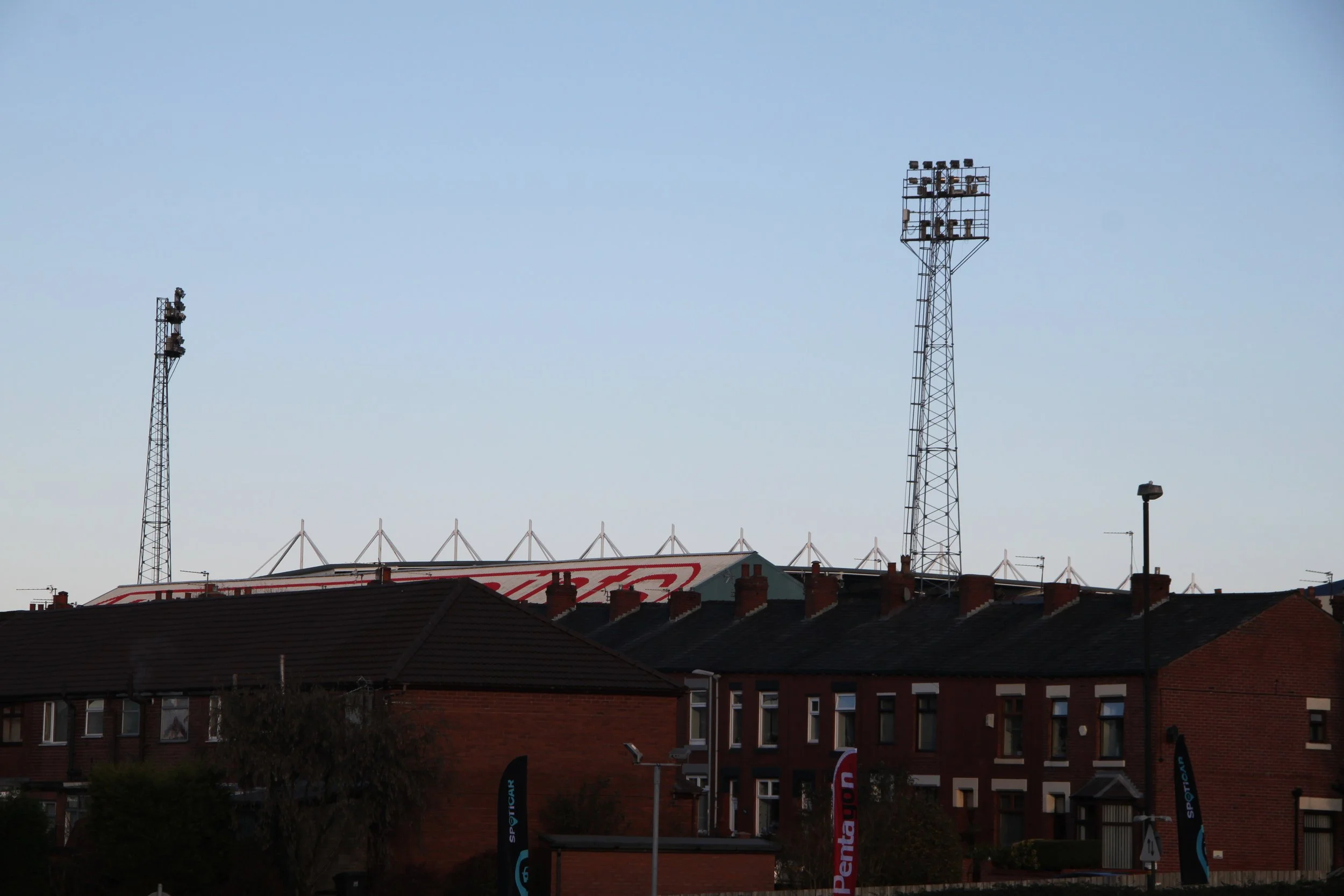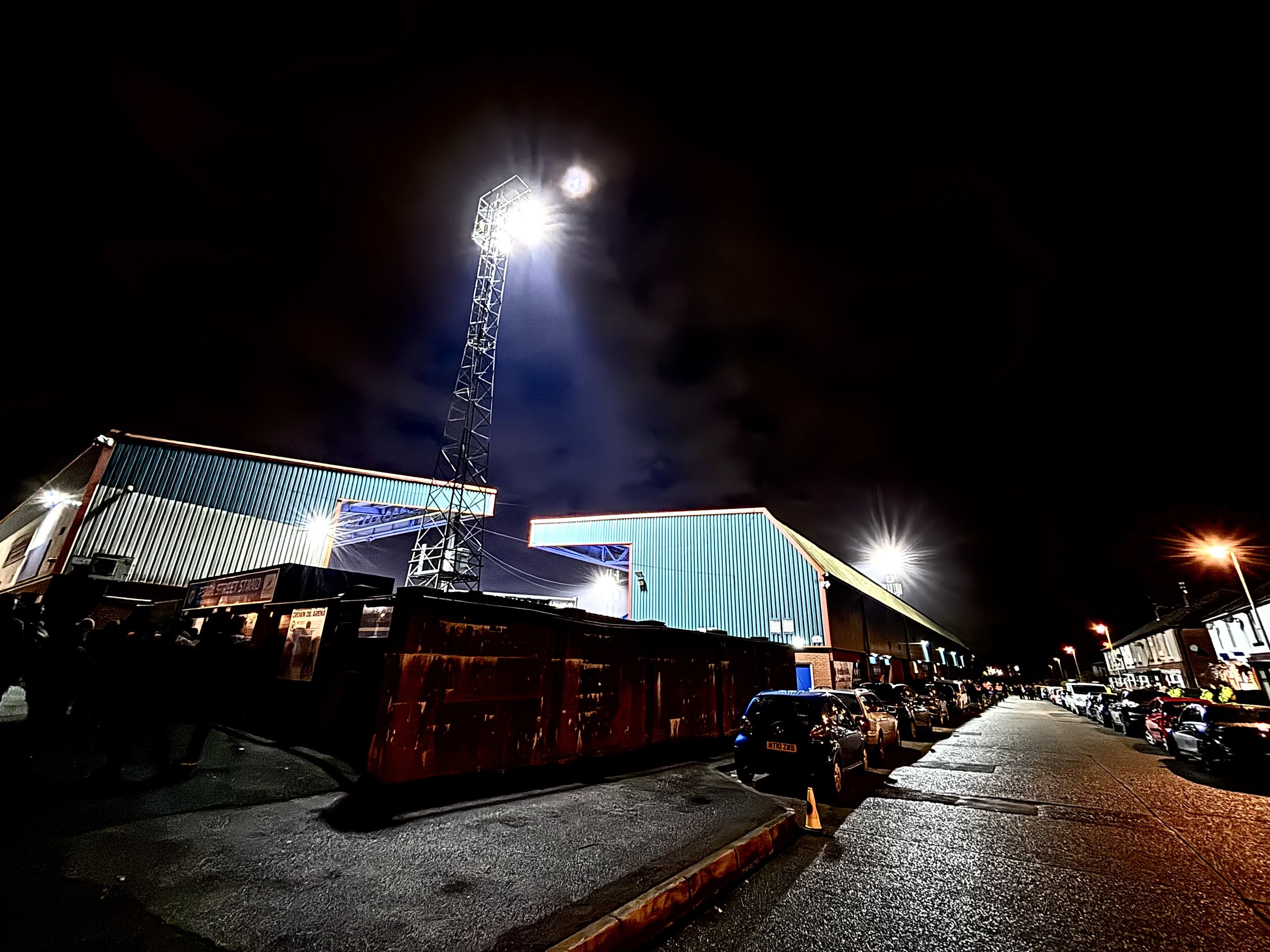Time and Mossley

Words: Nicky Iqbal
Images: Ed Stanley
Keep it coming
I’ve got time and money for the next life
But I’m here at night
Time and Money. DMA’s.
Formed in 1903 (initially as Park Villa), Mossley AFC, the club I find myself supporting and volunteering at most weekends, are only a couple of decades younger than the (former railway) club I’ve supported all my life.
Despite not having 20 league titles and three European cups, Mossley boast their own impressive haul of silverware; the list is long, but to name a few, six Manchester Premier Cup trophies (two of those back-to-back), twice Northern Premier League Premier champions, First Division champions once, Northern Premier Cup winners twice and last but not least, Challenge Shield winners.
Add to that, six appearances in the First Round proper of the FA Cup (most notably in 1969, when MAFC took Stockport County to a replay at Seel Park, in front of a crowd of 4,493), two appearances in the Second Round proper, and the infamous trip to Wembley in 1980 in the FA Challenge Trophy final vs Dagenham.
MAFC, sadly, went on to lose the game 2-1 in front of a crowd of 26,000, leaving the town back home bearing an uncanny resemblance to the opening scenes of 28 Days Later.
Mossley is a former farming and woollen industry town with a population of approximately 11,000, bordering three counties, Lancashire, Yorkshire and Cheshire. Having lived here for 20 years, I only stumbled across Seel Park about 10 years ago.
©Ed Stanley/ Terrace Edition. Mossley AFC.
My encounters with non-league football were previously limited to Curzon Ashton and Stalybridge Celtic (the latter only on account of the ground’s tongue-in-cheek nickname of ‘The Berna-Bower’.)
It’s worth noting at this stage, Seel Park is in top Mossley, a 0.7m walk to the ground from my house according to GPS. What it doesn’t tell you is that this directs you up the aptly named ‘heartbreak hill’.
You need a decent pair of walking shoes and moderate level of fitness to live (or attend a game) in Mossley.
I’ve been to matches on a regular basis from around 2017 and found, despite standing alone, people would come over and talk to me. This was the thing that stood out to me at Mossley, as a female supporter on their own, everyone went out of their way to ensure you were part of the crowd.
I used to travel to away games on my own and within weeks, MAFC supporters would talk to me and involve me in their groups.
Fast forward a few years and a couple of conversations with one of the club’s directors, followed by three lockdowns and endless ‘come and paint the ground’ days, at the end of 2020 I found myself a part of the committee at MAFC and with my current role as club volunteer and events coordinator.
©Ed Stanley/ Terrace Edition. Mossley AFC.
Typical matchday duties involve getting to the ground an hour before kick-off and selling raffle (it’s NOT a myth!), and golden goal tickets, programmes, and helping in the club shop.
Non-match duties include attending regular committee meetings, coordinating and running the events the club hosts, such as the annual Whit Friday brass bands contest, Mossley 10k run and the annual fireworks event, (where crowds of around 1500 pack into Seel Park).
There are a large team of volunteers at the club, from the catering guys who attend the sponsor’s lounge and run the pie hut, to the grounds staff, media, stewards, commercial and finance section.
Life as a volunteer at Mossley has introduced me to something I didn’t expect to come across again at football in community and belonging.
©Ed Stanley/ Terrace Edition. Mossley AFC.
The contrast from the stark and corporate world of Premier League football is vast. The more I despair at the ever-changing nature of ownership, fixtures dominated by SKY TV or monetisation of the game, the more I’m drawn to MAFC.
This really is ‘Mes que un club’. Away from matchdays, MAFC play such a pivotal role in the community. They support and host a range of groups including Mossley foodbank, and Angels Utd who are a group who support families through child loss.
MAFC is an inclusive club and are currently looking at ways to make the matchday experience more supportive for individuals with additional requirements, a project I’m proud to be working on.
The recent groundshare agreement with Bury AFC is another example of non-league pulling together and supporting each other at times of need.
You wouldn’t find the Glazers giving groundhoppers from overseas a lift to a Utd away game, but that’s what happens at MAFC.
©Ed Stanley/ Terrace Edition. Mossley AFC.
On non-match days, you’ll always find volunteers at the ground (directors and chairman too), collecting litter, marking the lines, fixing gates or doors and painting the changing rooms.
I’ve lost count of the number of walls I’ve painted in the last year (and spiders), but every tiny job contributes to the smooth running of the club once the gates are opened.
Volunteering isn’t a glamorous role, but it’s one that makes non-league sustainable.
There are days and evenings where the inclement weather in Mossley pushes the hardiest of souls to their limits. Everyone puts their own time in for free, for the love of the club.
It’s said that non-league provides the earthiness of the game we knew decades ago and crave ; the ‘paying on the gate, standing on the terraces with mates, a pint and pie, chips, peas n gravy, berating the liner and the poor goalie for the away team.
The volunteers ensure that the games go ahead so matchday supporters can experience all the above.
My role as a volunteer absorbs a lot of my spare time, but the returns are priceless. I get to spend matchdays with some incredible, like-minded people, watch football as it used to be when I was a kid, enjoy the camaraderie that non-league throws up, and know that everything you do is putting back into the community at Mossley.
The love affair with Utd will never falter, but the relationship with MAFC gives so much more enrichment in ways that league football never will.
©Ed Stanley/ Terrace Edition. Mossley AFC.
©Ed Stanley/ Terrace Edition. Mossley AFC.
©Ed Stanley/ Terrace Edition. Mossley AFC.
©Ed Stanley/ Terrace Edition. Mossley AFC.
©Ed Stanley/ Terrace Edition. Mossley AFC.
©Ed Stanley/ Terrace Edition. Mossley AFC.
©Ed Stanley/ Terrace Edition. Mossley AFC.
©Ed Stanley/ Terrace Edition. Mossley AFC.
©Ed Stanley/ Terrace Edition. Mossley AFC.
©Ed Stanley/ Terrace Edition. Mossley AFC.
©Ed Stanley/ Terrace Edition. Mossley AFC.
You can find Nicky on Twitter: @2605NI
Ed is on Twitter: @Ed_Stanley1




















